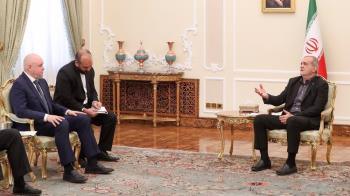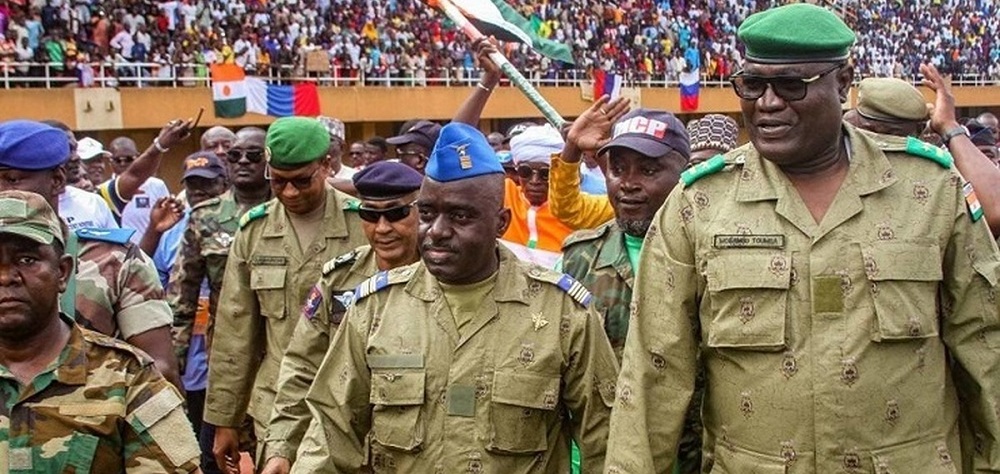Alwaght- A month and a half after military coup in Niger, France and its regional allies are still struggling to restore the ousted President Mohamed Bazoum to power. After the failure of negotiations with the military council for a political solution, the inclination to resort to military actions is gaining momentum more than before.
Colonel Amadou Abdel Rahman, a member of the ruling military council, on Sunday said in a statement that France continues to amass forces in Economic Community of West African States (ECOWAS) within the framework of preparation plan for military intervention in Niger.
“On September 7, a French military ship docked in Benin, carrying troops and military equipment. About 100 flights of military cargo planes and the transfer of large amounts of military equipment have also been observed in Senegal, Ivory Coast and Benin, and all these measures are taken to ensure success of military intervention in our country,” said Abdul Rahman.
After the military council gave the French ambassador 48 hours to leave the country, which means cutting off diplomatic relations with France, tensions have elevated to new heights, and with the Nigerien army on alert, the country has become a security environment. Although the French government on Saturday denied any plans for military action against Niger, the removal of the French troops from this African country have strengthened the theory of a potential military action.
The French officials try to paint the coup leaders of no legitimacy, but rallies of hundreds of thousands of Nigeriens in support of the army and torching the French flag and chanting slogans in support of expulsion of French colonialists indicated that the military council has major popular support even if the Western and ECOWAS sanctions strain living conditions of people.
How likely is a military intervention?
The reality is that in the current conditions, France cannot alone intervene in Nigeria, and the major reason that grants Paris leaders the temerity to mull using their last option is the massive support of the ECOWAS to the Western interests and the regional bloc’s enthusiasm to invade Niger. Earlier, ECOWAS warned that if the diplomatic pressures fail to reinstate Bazoum to power, they will intervene militarily. They even claimed to have set the date for invasion.
The military council of Niger has set a three-year period for the transfer of power to a civilian government, but France and ECOWAS have rejected the idea, arguing that the experience of Mali, Burkina Faso, and Guinea, which have seen coups in recent years, showed that military leaders do not fulfill their transition obligations. Therefore, France and its African allies have raised concerns about Niger and find military intervention the only option to restore their lost interests.
France and its allies in ECOWAS think that they can restore former government of Niger to power using military force, but there are some serious obstacles that can only broaden the dimensions of the crisis. According to experts, the conservatism of both sides sets up a big obstacle in front of the military conflict, especially that some parties with a role in the dispute, like Algeria, still work for a political solution to the crisis.
Although Paris has not officially confirmed the military intervention plan, Burkina Faso and Mali, though members of ECOWAS, have warned that they will support Niger in case of an invasion. According to reports, Burkina Faso army units entered Niger on Saturday under a partnership mission to train and develop the capabilities of the forces of the two countries in the fight against terrorism. Later in August, Burkina Faso and Mali sent fighters and weapons to Niger to defend its security in case of foreign invasion. The two countries also once again warned the bloc that any intervention in Niger would be a “declaration of war” on these countries.
The American stances, on the other side, do not seem to be in line with the French interests, something drawing Paris’s strong criticism of Washington. Nevertheless, the White House has seemly given a green light to the intervention despite support to a diplomatic solution. On September 7, the Pentagon spokeswoman Sabrina Signh in a press conference said that the “US forces based in Niger are shifting from Airport 101 near the capital of Niamey to Airport 201 in Agadez” which is 920 kilometers from the capital. However, it is unclear whether relocation of forces inside Niger means the American decision for full withdrawal of forces from this country.
On the other hand, trans-regional powers also have extensive interests in Niger, which will not remain silent in the face of the military intervention of France and its allies. China produces oil in Niger and needs stability and security in this country. Beside having economic interests and military relations with Niger, Turkey also operates Niamey international airport. Russia has strong relations with Mali and Burkina Fuso as neighbors of Niger, and had earlier warned against a military invasion in Niger. Therefore, all these countries obviously want a peaceful solution to the crisis and do not accept the use of force in Niger that would endanger their interests.
Domino of French losses in Africa
The domino of coups that take place one after another the French strongholds in Africa has caused deep concerns of French leaders. While still not recovering from Niger coup, France witnessed another coup in Gabon, removing Ali Bongo from power. Gabon coup disrupted the French cards for play in Niger as Paris sought to choke Niger with economic sanctions to prevent coups in other African countries, but its scenario failed.
France more than any other country takes damage from Africa coups, and the common point about all the six recent coups in Africa is that except for Sudan, Burkina Fuso, Niger, Mali, Guinea, Gambia, Sao Tome and Principle Island were former colonies of France, and even after independence, they have been controlled by Paris. But their leaders are eventually removed from power by a new generation of officers who are disappointed with unfulfilled pro-democracy promises in the past decades.
France, having shown weakness in the previous coups, this time is pushing to avoid losing Niger to Russia as was the case with Mali.
What provokes the French sensitivity to Niger is the rich economic interests. According to estimates, France produces 35 percent of its power from Nigerien uranium. France buys this uranium as a low price and for about $300 million a year. If it loses this strategic source of energy, it would have to seek other providers or import gas at a high price and this requires new investments for construction of thermal power plants, and given Ukraine aids burden, the cost will be high for Paris.
Also, Niger is considered the center of operations in the Sahel region after the expulsion of French forces from Mali and Burkina Faso and France operates a large military base in Niamey. According to experts, this French military base plays a key role in the fight against terrorism in Sahel and also monitors the waves of illegal African migration to Europe and is also the center of NATO operations in Africa.
It is not accidental that coups are taking place in favor of Russia and to some extent China and against the interests of the West and especially France that is the source of much of the disputes in Africa. After all, the colonial record of France is a source of discontentment of the Africans who do not want to continue life under Paris dominance forever.
Losing strategic points in Africa and possibility of further coups in this continent represent a test for Paris diplomacy to see how it can restore its lost interests. As observers put it, the French economy relies on African states for many of its needs and so the back-to-back African developments deal a big blow to Paris.



























